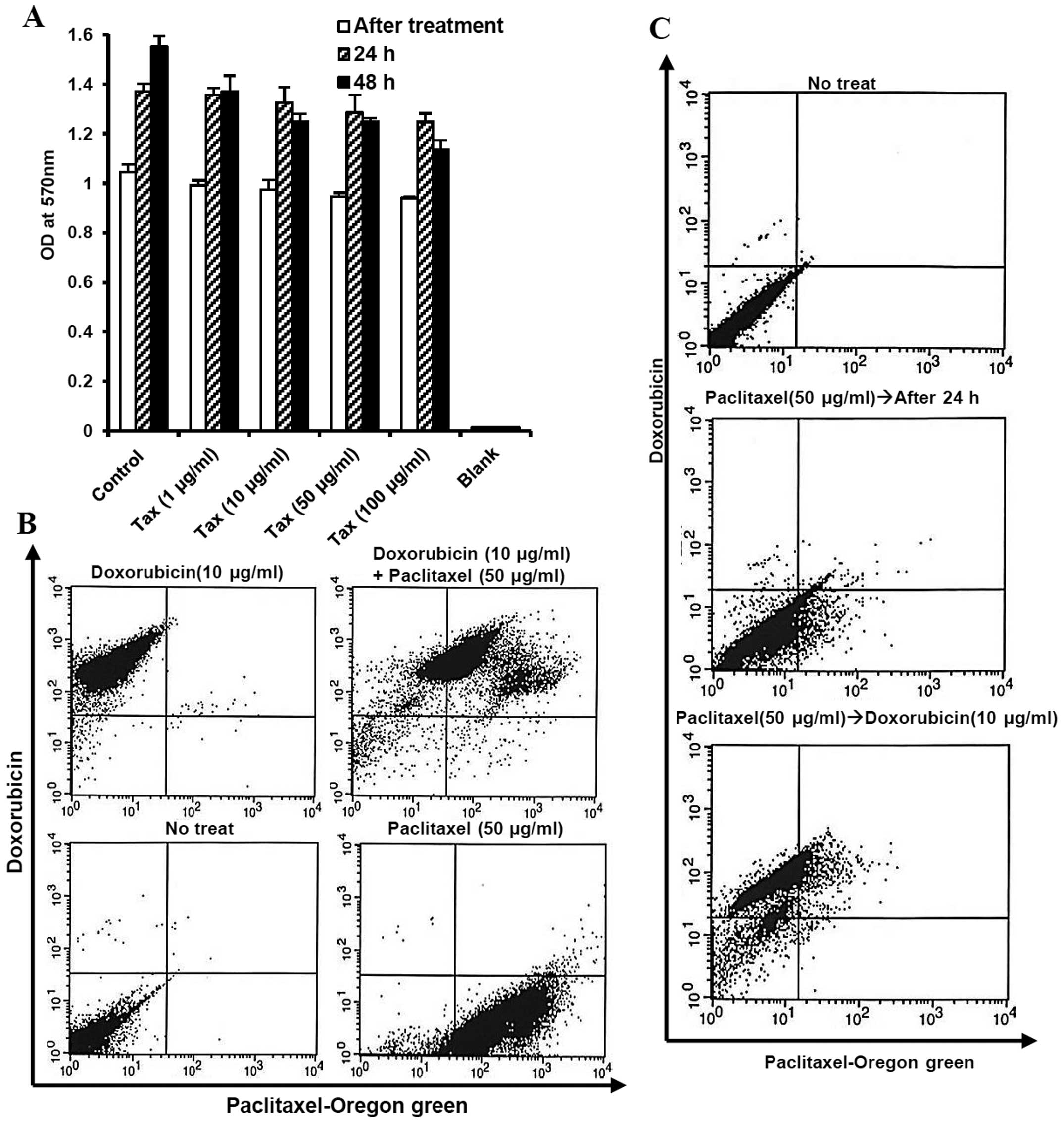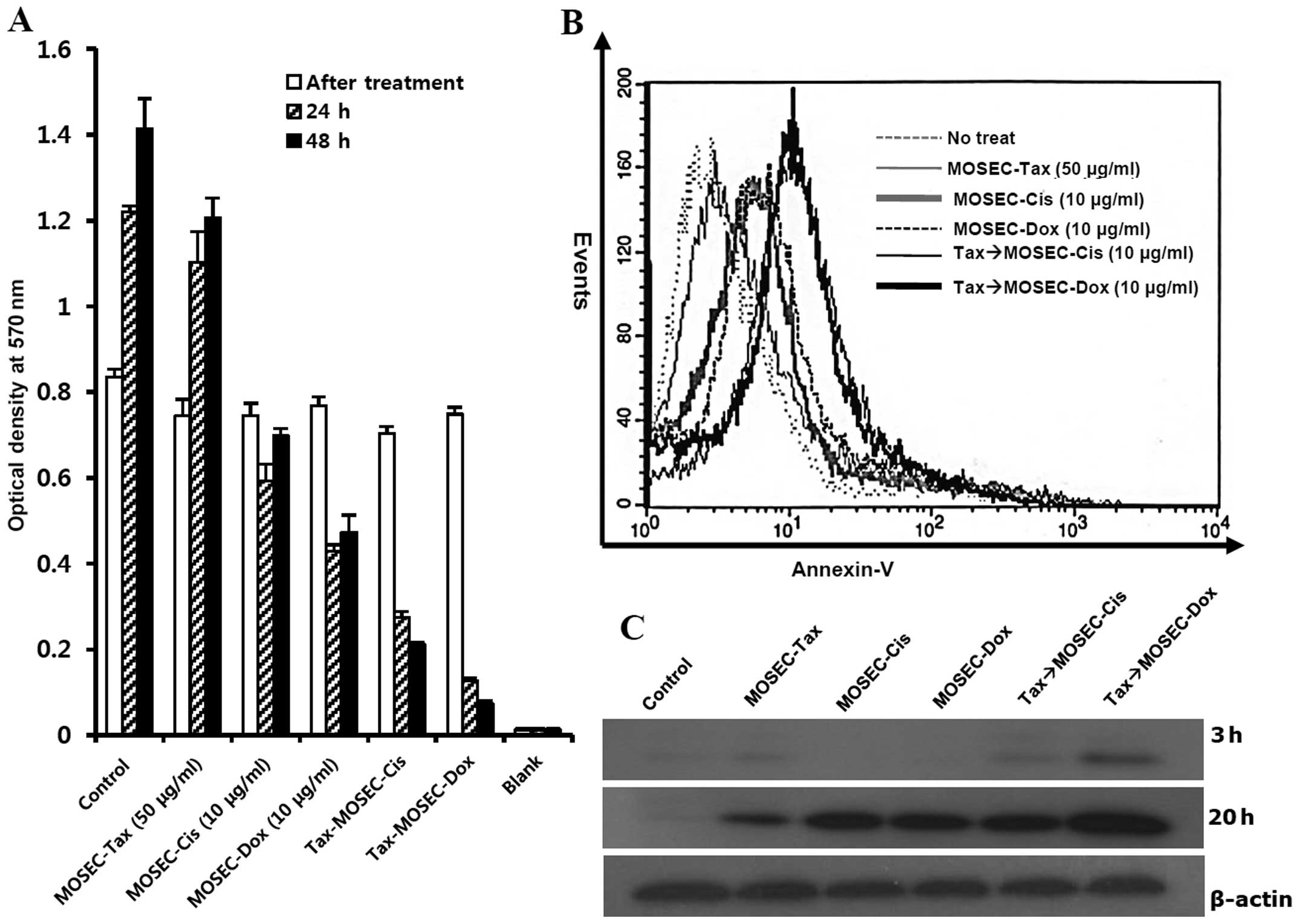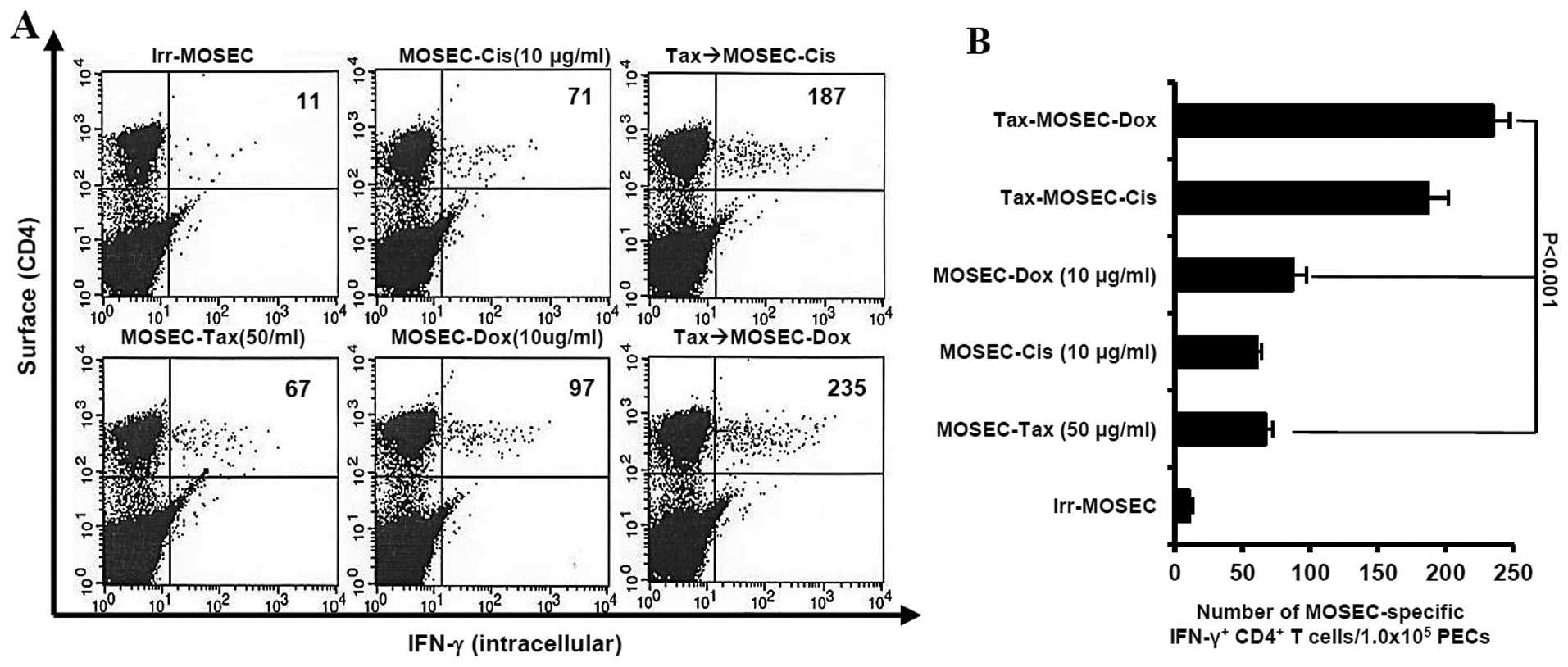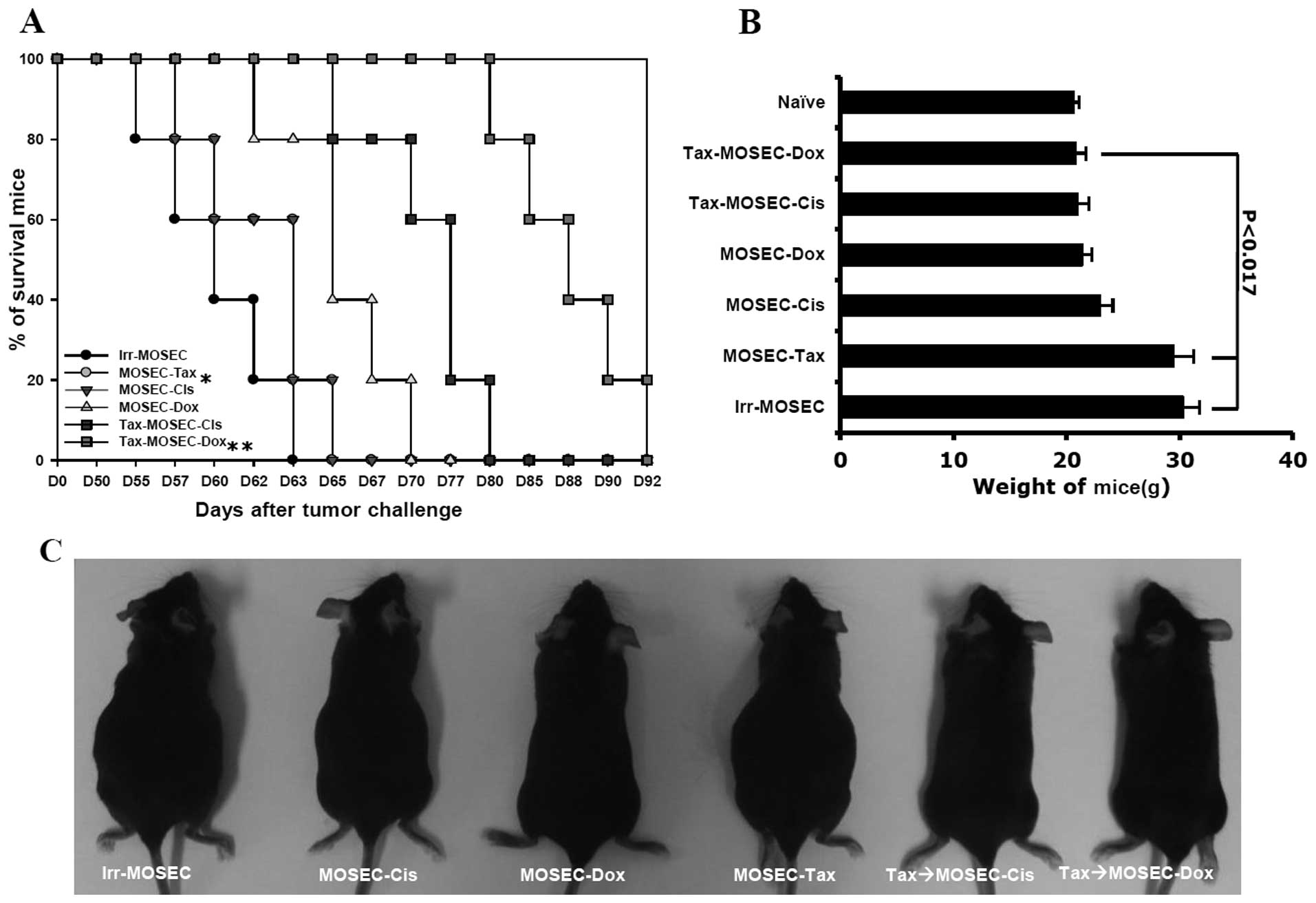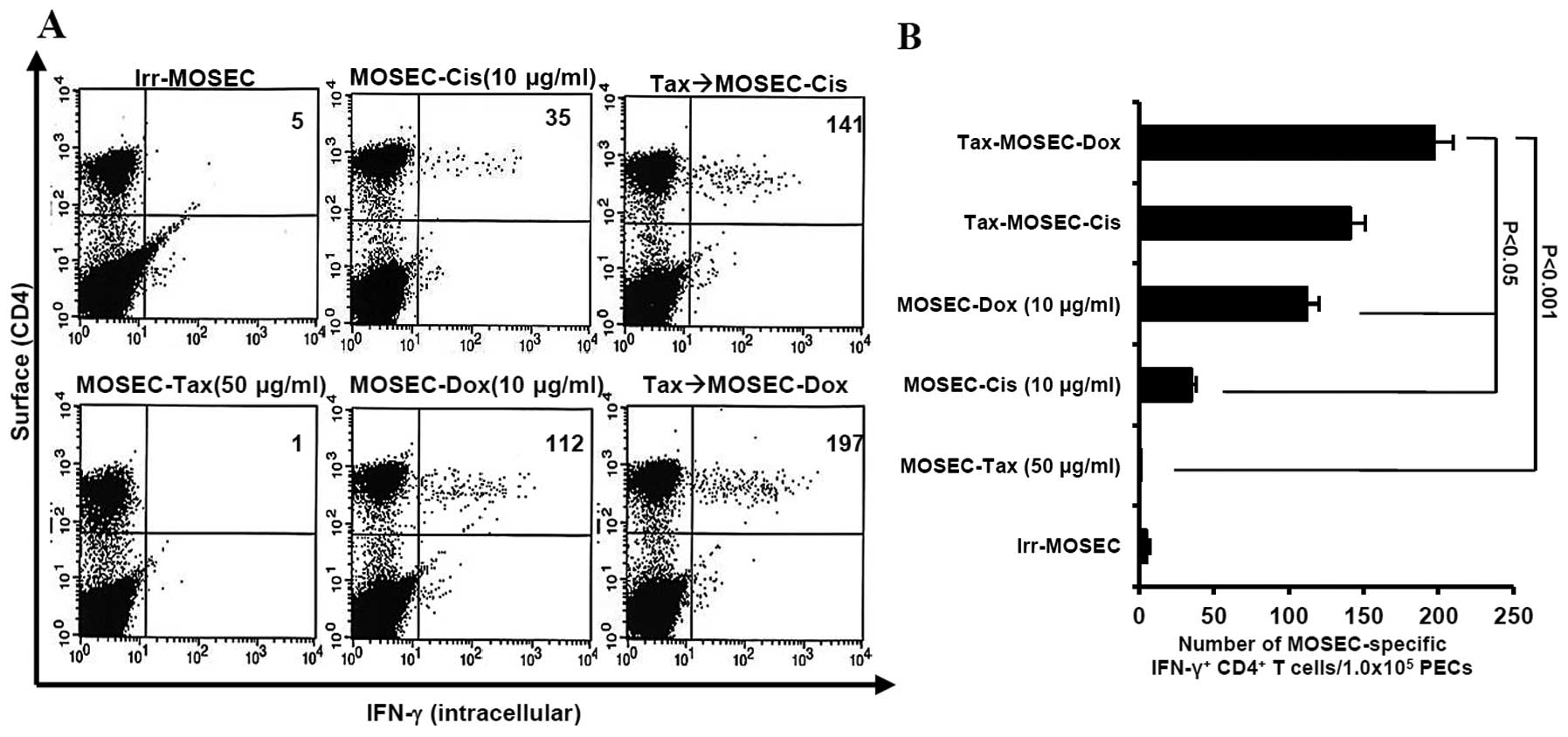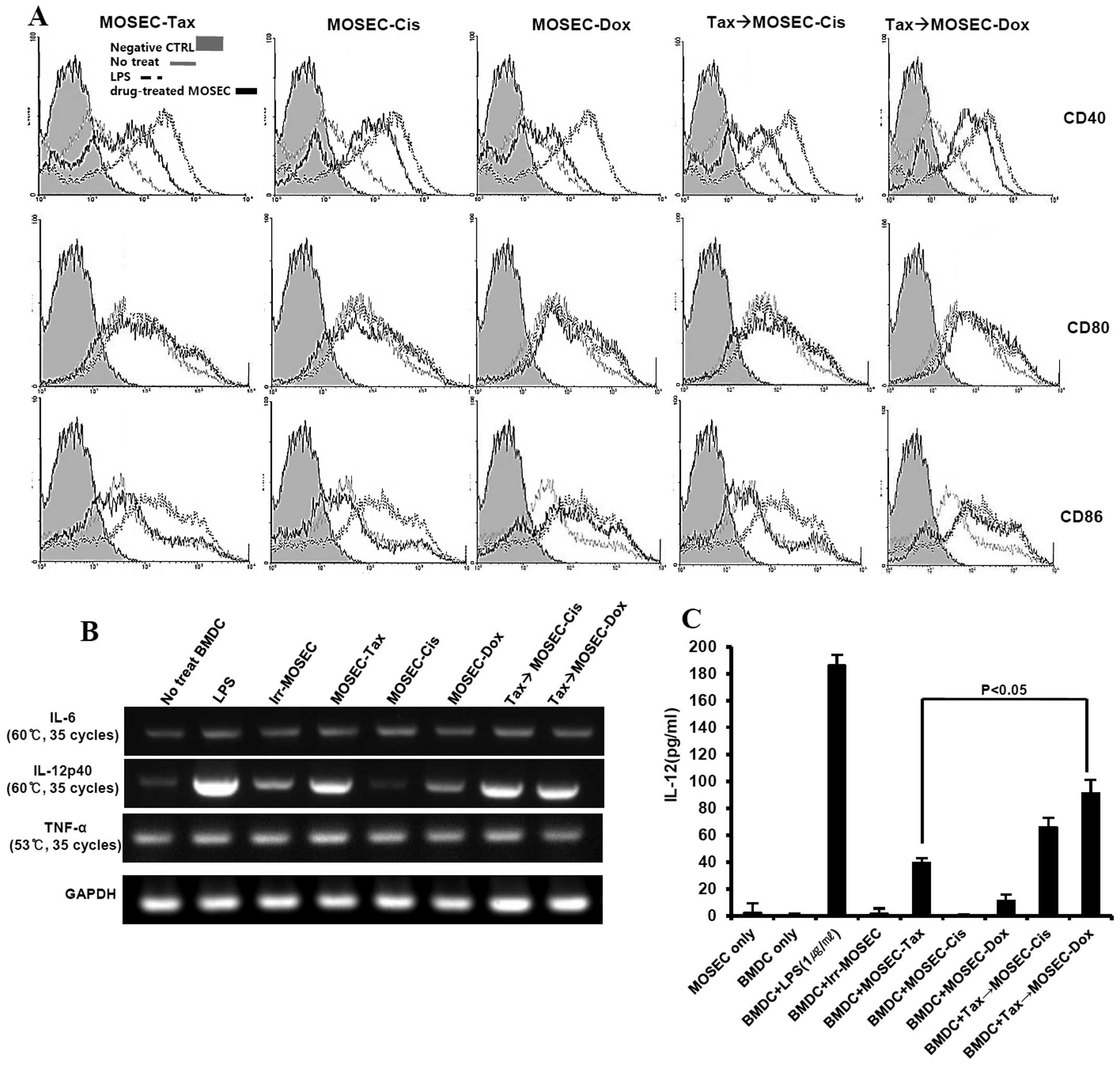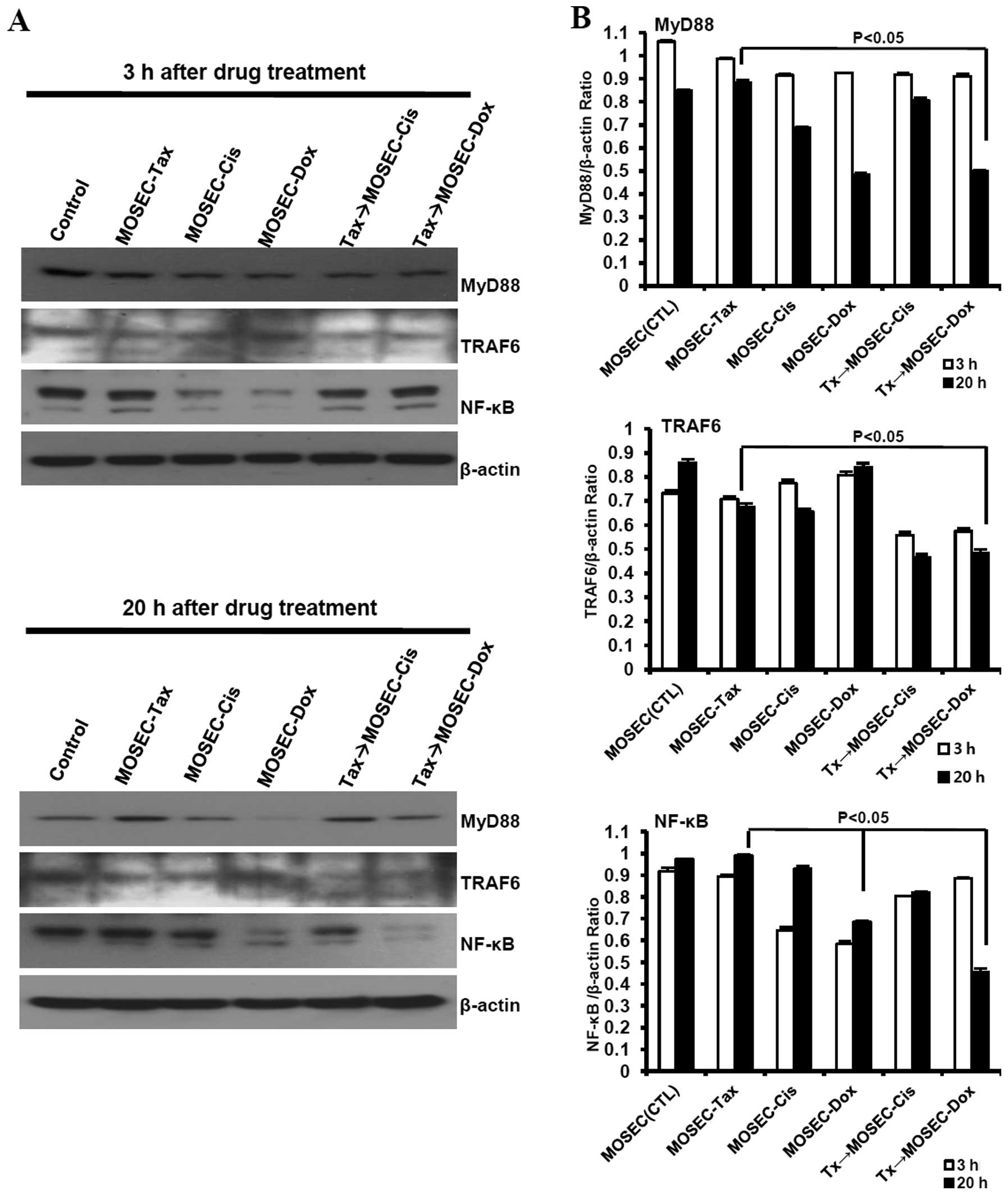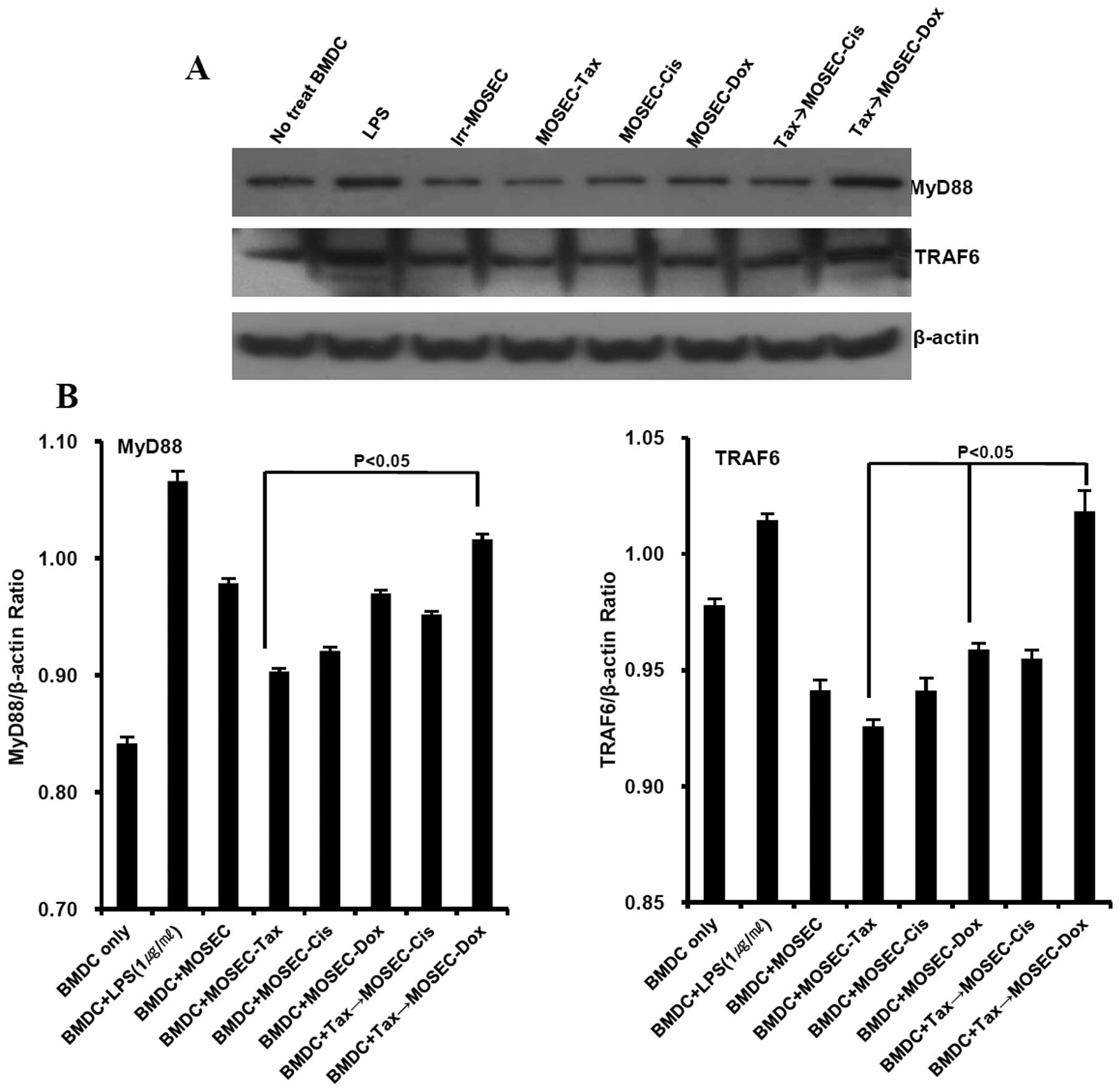|
1.
|
Yap TA, Carden CP and Kaye SB: Beyond
chemotherapy: targeted therapies in ovarian cancer. Nat Rev Cancer.
9:167–181. 2009. View
Article : Google Scholar : PubMed/NCBI
|
|
2.
|
Jemal A, Siegel R, Ward E, Hao Y, Xu J,
Murray T and Thun MJ: Cancer statistics, 2008. CA Cancer J Clin.
58:71–96. 2008. View Article : Google Scholar
|
|
3.
|
Dougan M and Dranoff G: Immune therapy for
cancer. Annu Rev Immunol. 27:83–117. 2009. View Article : Google Scholar
|
|
4.
|
Berchuck A, Iversen ES, Luo J, Clarke JP,
Horne H, Levine DA, Boyd J, Alonso MA, Secord AA, Bernardini MQ,
Barnett JC, Boren T, Murphy SK, Dressman HK, Marks JR and Lancaster
JM: Microarray analysis of early stage serous ovarian cancers shows
profiles predictive of favorable outcome. Clin Cancer Res.
15:2448–2455. 2009. View Article : Google Scholar : PubMed/NCBI
|
|
5.
|
Maw MK, Fujimoto J and Tamaya T:
Overexpression of inhibitor of DNA-binding (ID)-1 protein related
to angiogenesis in tumor advancement of ovarian cancers. BMC
Cancer. 9:4302009. View Article : Google Scholar : PubMed/NCBI
|
|
6.
|
Piccart MJ, Bertelsen K, James K, Cassidy
J, Mangioni C, Simonsen E, Stuart G, Kaye S, Vergote I, Blom R,
Grimshaw R, Atkinson RJ, Swenerton KD, Trope C, Nardi M, Kaern J,
Tumolo S, Timmers P, Roy JA, Lhoas F, Lindvall B, Bacon M, Birt A,
Andersen JE, Zee B, Paul J, Baron B and Pecorelli S: Randomized
intergroup trial of cisplatin-paclitaxel versus
cisplatin-cyclophosphamide in women with advanced epithelial
ovarian cancer: three-year results. J Natl Cancer Inst. 92:699–708.
2000.
|
|
7.
|
Fu Y, Hu D, Qiu J, Xie X, Ye F and Lu WG:
Overexpression of glycogen synthase kinase-3 in ovarian carcinoma
cells with acquired paclitaxel resistance. Int J Gynecol Cancer.
21:439–444. 2011. View Article : Google Scholar : PubMed/NCBI
|
|
8.
|
Kobayashi Y, Seino K, Hosonuma S, Ohara T,
Itamochi H, Isonishi S, Kita T, Wada H, Kojo S and Kiguchi K: Side
population is increased in paclitaxel-resistant ovarian cancer cell
lines regardless of resistance to cisplatin. Gynecol Oncol.
121:390–394. 2011. View Article : Google Scholar : PubMed/NCBI
|
|
9.
|
Duan Z, Duan Y, Lamendola DE, Yusuf RZ,
Naeem R, Penson RT and Seiden MV: Overexpression of MAGE/GAGE genes
in paclitaxel/doxorubicin-resistant human cancer cell lines. Clin
Cancer Res. 9:2778–2785. 2003.PubMed/NCBI
|
|
10.
|
Kawai T and Akira S: The role of
pattern-recognition receptors in innate immunity: update on
Toll-like receptors. Nat Immunol. 11:373–384. 2010. View Article : Google Scholar : PubMed/NCBI
|
|
11.
|
Akira S, Uematsu S and Takeuchi O:
Pathogen recognition and innate immunity. Cell. 124:783–801. 2006.
View Article : Google Scholar
|
|
12.
|
Cook DN, Pisetsky DS and Schwartz DA:
Toll-like receptors in the pathogenesis of human disease. Nat
Immunol. 5:975–979. 2004. View
Article : Google Scholar : PubMed/NCBI
|
|
13.
|
Kawasaki K, Akashi S, Shimazu R, Yoshida
T, Miyake K and Nishijima M: Mouse toll-like receptor 4.MD-2
complex mediates lipopolysaccharide-mimetic signal transduction by
Taxol. J Biol Chem. 275:2251–2254. 2000. View Article : Google Scholar : PubMed/NCBI
|
|
14.
|
Takeda K, Kaisho T and Akira S: Toll-like
receptors. Annu Rev Immunol. 21:335–376. 2003. View Article : Google Scholar
|
|
15.
|
Nozaki N, Shishido T, Takeishi Y and
Kubota I: Modulation of doxorubicin-induced cardiac dysfunction in
toll-like receptor-2-knockout mice. Circulation. 110:2869–2874.
2004. View Article : Google Scholar : PubMed/NCBI
|
|
16.
|
Szajnik M, Szczepanski MJ, Czystowska M,
Elishaev E, Mandapathil M, Nowak-Markwitz E, Spaczynski M and
Whiteside TL: TLR4 signaling induced by lipopolysaccharide or
paclitaxel regulates tumor survival and chemoresistance in ovarian
cancer. Oncogene. 28:4353–4363. 2009. View Article : Google Scholar : PubMed/NCBI
|
|
17.
|
Kreuz S, Siegmund D, Rumpf JJ, Samel D,
Leverkus M, Janssen O, Häcker G, Dittrich-Breiholz O, Kracht M,
Scheurich P and Wajant H: NFkappaB activation by Fas is mediated
through FADD, caspase-8, and RIP and is inhibited by FLIP. J Cell
Biol. 166:369–380. 2004. View Article : Google Scholar : PubMed/NCBI
|
|
18.
|
Tanimura N, Saitoh S, Matsumoto F,
Akashi-Takamura S and Miyake K: Roles for LPS-dependent interaction
and relocation of TLR4 and TRAM in TRIF-signaling. Biochem Biophys
Res Commun. 368:94–99. 2008. View Article : Google Scholar : PubMed/NCBI
|
|
19.
|
No authors listed: Cyclophosphamide plus
cisplatin versus cyclophosphamide, doxorubicin, and cisplatin
chemotherapy of ovarian carcinoma: a meta-analysis. The Ovarian
Cancer Meta-Analysis Project. J Clin Oncol. 9:1668–1674. 1991.
|
|
20.
|
A’Hern RP and Gore ME: Impact of
doxorubicin on survival in advanced ovarian cancer. J Clin Oncol.
13:726–732. 1995.PubMed/NCBI
|
|
21.
|
Roby KF, Taylor CC, Sweetwood JP, Cheng Y,
Pace JL, Tawfik O, Persons DL, Smith PG and Terranova PF:
Development of a syngeneic mouse model for events related to
ovarian cancer. Carcinogenesis. 21:585–591. 2000. View Article : Google Scholar : PubMed/NCBI
|
|
22.
|
Kim D, Hoory T, Monie A, Wu A, Hsueh WT,
Pai SI and Hung CF: Delivery of chemotherapeutic agents using
drug-loaded irradiated tumor cells to treat murine ovarian tumors.
J Biomed Sci. 17:612010. View Article : Google Scholar : PubMed/NCBI
|
|
23.
|
Fewell JG, Matar MM, Rice JS, Brunhoeber
E, Slobodkin G, Pence C, Worker M, Lewis DH and Anwer K: Treatment
of disseminated ovarian cancer using nonviral interleukin-12 gene
therapy delivered intraperitoneally. J Gene Med. 11:718–728. 2009.
View Article : Google Scholar : PubMed/NCBI
|
|
24.
|
Jang MJ, Kim JE, Chung YH, Lee WB, Shin
YK, Lee JS, Kim D and Park YM: Dendritic cells stimulated with
outer membrane protein A (OmpA) of Salmonella typhimurium
generate effective anti-tumor immunity. Vaccine. 29:2400–2410.
2011. View Article : Google Scholar : PubMed/NCBI
|
|
25.
|
Kim JE, Jang MJ, Lee JI, Chung YH, Jeong
JH, Hung CF and Kim D: Cancer cells containing nanoscale
chemotherapeutic drugs generate antiovarian cancer-specific
CD4+ T cells in peritoneal space. J Immunother. 35:1–13.
2012. View Article : Google Scholar : PubMed/NCBI
|
|
26.
|
Kelly MG, Alvero AB, Chen R, Silasi DA,
Abrahams VM, Chan S, Visintin I, Rutherford T and Mor G: TLR-4
signaling promotes tumor growth and paclitaxel chemoresistance in
ovarian cancer. Cancer Res. 66:3859–3868. 2006. View Article : Google Scholar : PubMed/NCBI
|
|
27.
|
Zbar B, Bernstein I, Tanaka T and Rapp HJ:
Tumor immunity produced by the intradermal inoculation of living
tumor cells and living Mycobacterium bovis (strain BCG).
Science. 170:1217–1218. 1970. View Article : Google Scholar : PubMed/NCBI
|
|
28.
|
Baum H and Baum M:
Methyl-cholanthrene-induced sarcomata in mice after immunisation
with Corynebacterium parvum plus syngeneic subcellular membrane
fractions. Lancet. 2:1397–1398. 1974. View Article : Google Scholar
|
|
29.
|
Jiang Z, Ninomiya-Tsuji J, Qian Y,
Matsumoto K and Li X: Interleukin-1 (IL-1) receptor-associated
kinase-dependent IL-1-induced signaling complexes phosphorylate
TAK1 and TAB2 at the plasma membrane and activate TAK1 in the
cytosol. Mol Cell Biol. 22:7158–7167. 2002. View Article : Google Scholar
|
|
30.
|
Xu Z, Ren T, Xiao C, Li H and Wu T: Nickel
promotes the invasive potential of human lung cancer cells via
TLR4/MyD88 signaling. Toxicology. 285:25–30. 2011. View Article : Google Scholar : PubMed/NCBI
|
|
31.
|
Coppolino MG, Woodside MJ, Demaurex N,
Grinstein S, St-Arnaud R and Dedhar S: Calreticulin is essential
for integrin-mediated calcium signalling and cell adhesion. Nature.
386:843–847. 1997. View Article : Google Scholar
|
|
32.
|
Obeid M, Tesniere A, Ghiringhelli F, Fimia
GM, Apetoh L, Perfettini JL, Castedo M, Mignot G, Panaretakis T,
Casares N, Métivier D, Larochette N, van Endert P, Ciccosanti F,
Piacentini M, Zitvogel L and Kroemer G: Calreticulin exposure
dictates the immunogenicity of cancer cell death. Nat Med.
13:54–61. 2007. View
Article : Google Scholar : PubMed/NCBI
|
|
33.
|
Yang R, Murillo FM, Cui H, Blosser R,
Uematsu S, Takeda K, Akira S, Viscidi RP and Roden RB:
Papillomavirus-like particles stimulate murine bone marrow-derived
dendritic cells to produce alpha interferon and Th1 immune
responses via MyD88. J Virol. 78:11152–11160. 2004. View Article : Google Scholar
|
|
34.
|
Sun J, Walsh M, Villarino AV, Cervi L,
Hunter CA, Choi Y and Pearce EJ: TLR ligands can activate dendritic
cells to provide a MyD88-dependent negative signal for Th2 cell
development. J Immunol. 174:742–751. 2005. View Article : Google Scholar : PubMed/NCBI
|
|
35.
|
Kayashima H, Toshima T, Okano S, Taketomi
A, Harada N, Yamashita Y, Tomita Y, Shirabe K and Maehara Y:
Intratumoral neoadjuvant immunotherapy using IL-12 and dendritic
cells is an effective strategy to control recurrence of murine
hepatocellular carcinoma in immunosuppressed mice. J Immunol.
185:698–708. 2010. View Article : Google Scholar
|
|
36.
|
Ma Y, Zhang X, Bao H, Mi S, Cai W, Yan H,
Wang Q, Wang Z, Yan J, Fan G, Lindsey ML and Hu Z: Toll-like
receptor (TLR) 2 and TLR4 differentially regulate doxorubicin
induced cardiomyopathy in mice. PLoS One. 7:e407632012. View Article : Google Scholar : PubMed/NCBI
|
|
37.
|
Kennedy R and Celis E: Multiple roles for
CD4+ T cells in anti-tumor immune responses. Immunol
Rev. 222:129–144. 2008.
|
|
38.
|
Hunder NN, Wallen H, Cao J, Hendricks DW,
Reilly JZ, Rodmyre R, Jungbluth A, Gnjatic S, Thompson JA and Yee
C: Treatment of metastatic melanoma with autologous CD4+
T cells against NY-ESO-1. N Engl J Med. 358:2698–2703. 2008.
View Article : Google Scholar : PubMed/NCBI
|
|
39.
|
Perez-Diez A, Joncker NT, Choi K, Chan WF,
Anderson CC, Lantz O and Matzinger P: CD4 cells can be more
efficient at tumor rejection than CD8 cells. Blood. 109:5346–5354.
2007. View Article : Google Scholar : PubMed/NCBI
|















